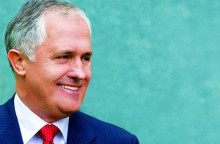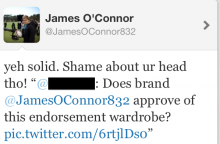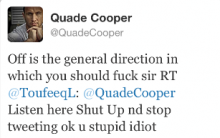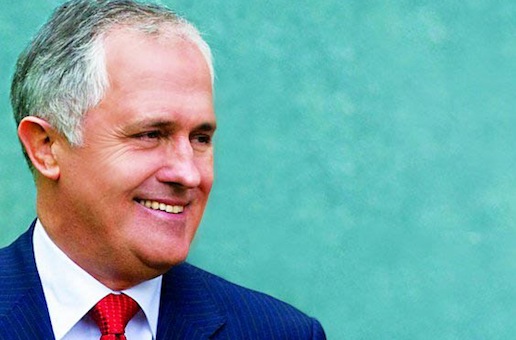 This hullaballoo over trolling raises a bagful of issues— few of which are seeing the light of day over the political and media grandstanding this bandwagon has created.
This hullaballoo over trolling raises a bagful of issues— few of which are seeing the light of day over the political and media grandstanding this bandwagon has created.
What follows is a little Twitter conversation I had with the Hon. Malcolm Turnbull MP last night. It starts with my adding a (sarcastic) comment to a retweet of his call for people to join a Twitter petition started by a tabloid newspaper. The stated objective of the petition is to:
Push for Twitter to be obligated to work with authorities when these cowards have broken the law, bullied and abused others simply because they can, hidden by their anonymity….Sign our petition and help make Twitter a better place for all users.
No — there are no clear terms of any actual measures they are proposing, but clearly the anonymity of the ‘cowards’ is a key problem.
@MattRowley_ call me old fashioned, but I cannot agree that twitter excuses people from the ordinary consequences of defamation etc
— Malcolm Turnbull (@TurnbullMalcolm) September 12, 2012
The first observation has to be that the petition says nothing about defamation, just bullying. As per my sarcastic quip, the beauty of services like Twitter (and unlike the ‘real’ world) is that you don’t need to suffer personally in the face of a bully, or take them to court. You can press a ‘Block and Report’ button. You will never hear from that person again.
The history of Facebook shows that even when people are named, bullying still occurs. Anonymity is not the trigger.
Nevertheless, to stay with Malcolm, the issue of defamation on Twitter is an interesting one. Anonymous trolls invariably have bugger-all followers as their timelines offer less entertainment than an Aussie Super Rugby derby. So when they send a defamatory tweet to or about anyone, it has no more material impact than if they’d said it to their idiot mates down the pub.
This is an important legal point, because whether or not there is a substantial case for defamation depends on how widely the defaming message has been spread. Some will say ‘It’s out there forever though, on the internet!’ Well, as of March this year there were 340 million tweets sent per day. The chances of @NutJob’s tweet creating a meaningful digital footprint are literally zilch.
Unless, of course, the celebrity/rugby league player who was the target of it decides to tell the world about it via their thousands of Twitter followers and/or access to established media. In this case, who’s doing the defaming?
To go a little further, there are some interesting case studies in ‘reciprocity’ out there in our own sport, as our own social media analyst Cat has pointed out.
 In the world of celebrity tweeting, where does fighting trolls stop, and celebrity twitter-bullying start?
In the world of celebrity tweeting, where does fighting trolls stop, and celebrity twitter-bullying start?
In July this year, James O’Connor (at the time, 204 000 followers) decided to “give it back” to a follower (at the time, 68 followers) who questioned his injury in a smart-arse manner. He essentially called this woman ugly in front of all 204 000 followers. Earlier in the year he took exception to another woman asking him if the jersey he was wearing (appearing to be a Western Force jersey) was appropriate given he now plays for the Rebels. He responded by calling this woman ugly in front of his (at the time) 110 000 followers.
 Quade Cooper responded to a twitter critic who told him to shut up and stop tweeting and he then called him a stupid idiot. Quade retorted with a witty directive to f**k off. Quade has 608K+ followers and @ToufeeqL has 45 followers. Earlier in the year, Quade had been “trolled” by another fan who told him he’d look like a tool with long hair. He responded by telling this follower that he was a waste of space and he’d look like a dick with no balls. Young Henry was a comparative ‘giant’ on the twittersphere with 81 followers.
Quade Cooper responded to a twitter critic who told him to shut up and stop tweeting and he then called him a stupid idiot. Quade retorted with a witty directive to f**k off. Quade has 608K+ followers and @ToufeeqL has 45 followers. Earlier in the year, Quade had been “trolled” by another fan who told him he’d look like a tool with long hair. He responded by telling this follower that he was a waste of space and he’d look like a dick with no balls. Young Henry was a comparative ‘giant’ on the twittersphere with 81 followers.
My question is where does the responsibility fall? On their followers who are showing off their coolness in front of less than 100 followers? Or on the celebrity who belittles them in front of hundreds of thousands of followers? Is this an equitable relationship?
Many of us would say these ‘trolls’ are simply getting their just desserts — clearly they started the exchanges. But if a puny kid came up to you in the street and gave you a pathetic shove, would you be entitled to blow their heads off with a Magnum, claiming self-defence?
Back to the main, and most important argument — is there a valid case for anonymity on the internet, or is this just a shield for trolls?
@MattRowley_ @osbornered fair enough. but this isnt egypt
— Malcolm Turnbull (@TurnbullMalcolm) September 12, 2012
Is trolling different to social revolution? Clearly. I don’t defend trolling, and I don’t use anonymity myself, but I defend the little guy’s right to it, because you just never know when you’ll need it.
Let’s say you’re a ‘low-down’ working for a government department, but want to share views contra to government policy. Should you be able to do that anonymously, or should your choices be to shut up or lose your job? Sure, the current regime say this database of Twitterers will only be used for cases of bullying or defamation, but what happens when the next lot decide to broaden their definitions under different circumstances?
Which is why my last tweet to Malcolm was this:
http://twitter.com/MattRowley_/statuses/245878632097128448
This is a far-reaching discussion that will have far-reaching consequences into the future for ‘the little guy’ in Australia. Let’s not have them shaped by this month’s desire for airtime and the odd celebrity with their nose out of joint.

